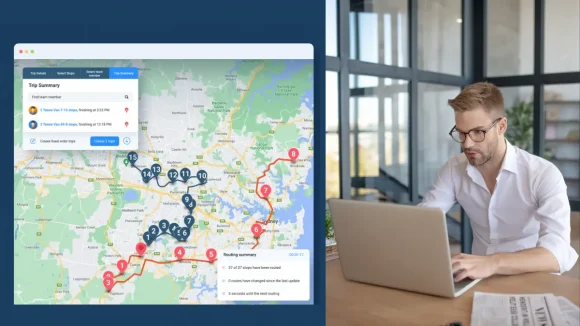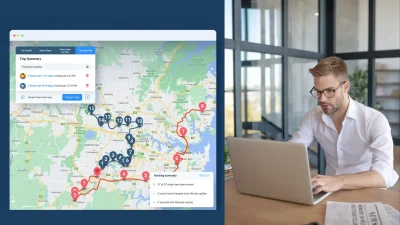When it comes to navigating through multiple destinations efficiently, businesses and individuals often turn to the convenience of Google Maps. With its extensive mapping data and navigation capabilities, Google Maps has become a go-to tool for planning routes. However, a common question arises: Can Google Maps optimize a route with multiple stops? In this article, we will explore the capabilities of Google Maps in optimizing multi-stop routes and delve into the concept of generating an optimized route that ensures the most efficient path for reaching multiple destinations.
Understanding Route Optimization with Google Maps
Google Maps has a route optimization tool that seeks to provide the shortest route between numerous stops. To generate an efficient route, the algorithm takes into account aspects such as distance, traffic conditions, and projected journey times. However, understanding the limitations and complexities of this functionality is critical for efficiently managing expectations
Can google maps optimize a route with multiple stops?
Can google maps optimize a route with multiple stops? Yes! Google Maps has a route optimization option that can optimize multiple-stop routes. It seeks to provide the most efficient route through several locations. Google Maps will build an ideal route based on parameters such as distance, traffic conditions, and projected travel times if you specify the beginning point and add additional stops in the preferred sequence. While it lacks the complex features of dedicated route planning software, Google Maps can nevertheless help you save time by proposing the most effective route for many stops.

Planning a Route with Multiple Stops in Google Maps
Follow these steps on Google Maps to plan a route with numerous stops:
Enter your starting place into Google Maps.
- Tap the “+” button to add more stops in the order you want to see them.
- When all of the stops have been entered, hit “Done” to build the optimum route.
- Google Maps Route Settings Customization:
- Google Maps provides some modification options for tailoring the route to your unique requirements:
- Setting stop priority: You can prioritize certain stops, impacting the optimization algorithm.
- Specifying arrival and departure times for each stop: If you have time limits for specific locations, you can set arrival and departure hours.
- Choosing a route: Google Maps allows you to optimize for the fastest route, the shortest distance, or to avoid toll roads and highways.

Increasing Productivity with Google Maps
To improve route efficiency in Google Maps, do the following:
- Group stops based on proximity: Arrange stops logically to reduce backtracking and overall travel mileage.
- Consider the traffic situation and the time of day: Keep in mind peak traffic hours and anticipated traffic congestion that may affect travel times.
- Make use of real-time traffic updates: Keep an eye on traffic conditions and use alternate routes as needed.
Evaluating the Results
After determining the best route, it is vital to review and make any required changes to guarantee a safe and efficient journey.
Examining and Modifying the Route
After Google Maps generates the optimum route, thoroughly inspect it. Check that the route corresponds to your tastes and needs. Take note of the arrangement of the stops and make sure they are in a logical sequence. If you detect any inconsistencies or want to avoid certain locations or areas, you can manually adjust the route by dragging and dropping the stops to rearrange their order.
Anticipated Arrival Times
One of the most useful features of Google Maps’ route optimization function is the ability to provide anticipated arrival times. These estimates are dependent on variables such as distance, traffic conditions, and route selection. While Google Maps generally delivers realistic estimates, it is critical to double-check their accuracy, especially if your stops have time-sensitive commitments or time windows. Unexpected traffic congestion or road closures may have an impact on the accuracy of the predicted arrival timings.
Managing Unexpected Problems or Detours
It is critical to be prepared for unforeseen events such as road closures, construction, or traffic incidents that may influence your path. While Google Maps tries to provide real-time updates and rerouting alternatives, it is still a good idea to be aware of any potential issues along your planned path. To avoid unexpected complications, keep an eye on traffic conditions and use alternate navigation apps or services that provide up-to-date information. Make manual alterations to the route as needed, based on your knowledge of local road conditions or alternate routes.
Google Maps Limitations
While Google Maps is a popular navigation tool, it has certain drawbacks when it comes to optimizing routes with multiple stops:
Lack of advanced customization
When compared to dedicated route optimization tools, Google Maps offers fewer customization choices. It might not have capabilities like establishing particular time slots for each trip or prioritizing stops based on personal preferences.
Limited scalability
Google Maps may struggle to handle a high number of stops. The optimization method may struggle to design an effective route when the number of stops rises, resulting in poor solutions or longer trip times.
Inability to account for complicated limitations
If your route planning involves complex constraints such as vehicle capacities, driver skills, or load balance, Google Maps may fall short.
While Google Maps delivers real-time traffic updates, it may not provide powerful tracking and monitoring features for many vehicles or drivers. This can make it difficult to monitor and manage your routes in real time.
Google Maps route planner alternative
Locate2u is a better option than Google Maps when it comes to route optimization for multiple stops. While Google Maps is a popular navigation application, Locate2u has several specialized capabilities built exclusively for businesses that rely on efficient multi-stop routes.
Advanced Route Personalization
Locate2u offers many customization possibilities that go beyond what Google Maps gives. You may define particular time slots for each stop, prioritize stops based on numerous factors, and take into account complex limitations such as vehicle capacity, driver skills, and load balance with Locate2u. This level of personalization gives you complete control over your routes, assuring optimum efficiency and resource optimization.
Scalability for Large Operations
Locate2u excels at scalability for enterprises with large-scale operations or broad distribution networks. Unlike Google Maps, which may struggle to manage and optimize routes with a big number of destinations, Locate2u is specifically built to manage and optimize routes with a large number of destinations. It can easily handle the complexities of scheduling and routing for large activities.
Tracking and updates in real-time
While Google Maps gives real-time traffic updates, Locate2u takes it a step further by providing real-time tracking and updates for numerous vehicles or drivers. You can use Locate2u to watch your fleet’s progress, track vehicle whereabouts, forecast arrival times, and even notify consumers about deliveries or appointments. This level of transparency improves operational efficiency and consumer satisfaction.

Conclusion
With Locate2u’s advanced features and customization options, businesses can effortlessly plan and optimize multi-stop routes. It allows users to define time windows for each stop, prioritize destinations, and consider complex constraints specific to their operations.
Our software’s scalability is another advantage over the Google Maps app. It can handle a high volume of stops and extensive delivery routes, making it ideal for businesses with large-scale operations. Locate2u can also can efficiently manage complex scheduling and routing requirements, ensuring that businesses can effectively navigate their delivery routes and reach their final destinations with precision.
Click here and start optimizing your delivery routes with us today!
About the author
Marketing Coordinator at Locate2u having completed a Bachelor of Creative Arts, majoring in English Literature and Creative Writing. I have extensive experience in editing and proofreading, as well as creating content for a range of audiences.











